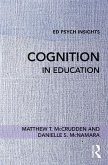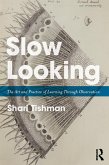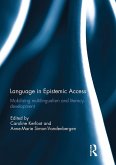Handbook of Epistemic Cognition (eBook, PDF)
Redaktion: Greene, Jeffrey A.; Bråten, Ivar; Sandoval, William A.
120,95 €
120,95 €
inkl. MwSt.
Sofort per Download lieferbar

60 °P sammeln
120,95 €
Als Download kaufen

120,95 €
inkl. MwSt.
Sofort per Download lieferbar

60 °P sammeln
Jetzt verschenken
Alle Infos zum eBook verschenken
120,95 €
inkl. MwSt.
Sofort per Download lieferbar
Alle Infos zum eBook verschenken

60 °P sammeln
Handbook of Epistemic Cognition (eBook, PDF)
Redaktion: Greene, Jeffrey A.; Bråten, Ivar; Sandoval, William A.
- Format: PDF
- Merkliste
- Auf die Merkliste
- Bewerten Bewerten
- Teilen
- Produkt teilen
- Produkterinnerung
- Produkterinnerung

Bitte loggen Sie sich zunächst in Ihr Kundenkonto ein oder registrieren Sie sich bei
bücher.de, um das eBook-Abo tolino select nutzen zu können.
Hier können Sie sich einloggen
Hier können Sie sich einloggen
Sie sind bereits eingeloggt. Klicken Sie auf 2. tolino select Abo, um fortzufahren.

Bitte loggen Sie sich zunächst in Ihr Kundenkonto ein oder registrieren Sie sich bei bücher.de, um das eBook-Abo tolino select nutzen zu können.
Epistemic cognition is a topic originating across disciplines with immediate applications in Education research. The Handbook of Epistemic Cognition brings together leading work from across disciplines, providing a comprehensive overview of this increasingly important topic.
- Geräte: PC
- mit Kopierschutz
- eBook Hilfe
- Größe: 2.78MB
Andere Kunden interessierten sich auch für
![Cognition in Education (eBook, PDF) Cognition in Education (eBook, PDF)]() Matthew T. McCruddenCognition in Education (eBook, PDF)30,95 €
Matthew T. McCruddenCognition in Education (eBook, PDF)30,95 €![Slow Looking (eBook, PDF) Slow Looking (eBook, PDF)]() Shari TishmanSlow Looking (eBook, PDF)36,95 €
Shari TishmanSlow Looking (eBook, PDF)36,95 €![Handbook of Educational Psychology (eBook, PDF) Handbook of Educational Psychology (eBook, PDF)]() Handbook of Educational Psychology (eBook, PDF)104,95 €
Handbook of Educational Psychology (eBook, PDF)104,95 €![Language in Epistemic Access (eBook, PDF) Language in Epistemic Access (eBook, PDF)]() Language in Epistemic Access (eBook, PDF)38,95 €
Language in Epistemic Access (eBook, PDF)38,95 €![Epistemic Justice, Mindfulness, and the Environmental Humanities (eBook, PDF) Epistemic Justice, Mindfulness, and the Environmental Humanities (eBook, PDF)]() Janelle AdsitEpistemic Justice, Mindfulness, and the Environmental Humanities (eBook, PDF)38,95 €
Janelle AdsitEpistemic Justice, Mindfulness, and the Environmental Humanities (eBook, PDF)38,95 €![Language and the Joint Creation of Knowledge (eBook, PDF) Language and the Joint Creation of Knowledge (eBook, PDF)]() Neil MercerLanguage and the Joint Creation of Knowledge (eBook, PDF)45,95 €
Neil MercerLanguage and the Joint Creation of Knowledge (eBook, PDF)45,95 €![Epistemic Injustice (eBook, PDF) Epistemic Injustice (eBook, PDF)]() Epistemic Injustice (eBook, PDF)52,95 €
Epistemic Injustice (eBook, PDF)52,95 €-
-
-
Epistemic cognition is a topic originating across disciplines with immediate applications in Education research. The Handbook of Epistemic Cognition brings together leading work from across disciplines, providing a comprehensive overview of this increasingly important topic.
Dieser Download kann aus rechtlichen Gründen nur mit Rechnungsadresse in A, B, BG, CY, CZ, D, DK, EW, E, FIN, F, GR, HR, H, IRL, I, LT, L, LR, M, NL, PL, P, R, S, SLO, SK ausgeliefert werden.
Produktdetails
- Produktdetails
- Verlag: Taylor & Francis eBooks
- Seitenzahl: 542
- Erscheinungstermin: 22. Januar 2016
- Englisch
- ISBN-13: 9781317746874
- Artikelnr.: 44757106
- Verlag: Taylor & Francis eBooks
- Seitenzahl: 542
- Erscheinungstermin: 22. Januar 2016
- Englisch
- ISBN-13: 9781317746874
- Artikelnr.: 44757106
- Herstellerkennzeichnung Die Herstellerinformationen sind derzeit nicht verfügbar.
Jeffrey A. Greene is an associate professor in the Learning Sciences and Psychological Studies program in the School of Education at the University of North Carolina at Chapel Hill. William A. Sandoval is a professor in the division of Urban Schooling at the UCLA Graduate School of Education & Information Studies. Ivar Bråten is a professor of Educational Psychology at the Faculty of Educational Sciences at the University of Oslo, Norway.
Chapter 1. Introduction (Jeffrey A. Greene, William A. Sandoval, Ivar
Bråten). Section 1: Psychological Perspectives on Epistemic Cognition
(Jeffrey A. Greene). Chapter 2. Epistemic Cognition as a Psychological
Construct: Advancements and Challenges (Barbara K. Hofer). Chapter 3.
Argumentative Reasoning (Kalypso Iordanou, Panayiota Kendeou, & Katinka
Beker). Chapter 4. Logical and Causal Reasoning (David Moshman & Pina
Tarricone). Chapter 5. Theory of Mind (Beate Sodian & Susanne Kristen).
Chapter 6. Social Cognition (Fabrice Clément & Nathalie Terrier). Chapter
7. Responses to Handbook Section 1 (Patricia Alexander). Section 2:
Disciplinary Perspectives on Epistemic Cognition (William A. Sandoval).
Chapter 8. Epistemic Cognition in Science: Uncovering old roots to turn
over new leaves (Andrew Elby, Chris Macrander, & David Hammer). Chapter 9.
Epistemic Cognition in History (Bruce VanSledright & Lilana Maggioni).
Chapter 10. Mathematical Epistemic Cognition (Fien Depaepe, Erik De Corte,
& Lieven Verschaffel). Chapter 11. Epistemic Cognition in Literary
Reasoning (Carol Lee, Susan Goldman, Sarah Levine, Joe Magliano, Mariya
Yukhymenko-Lescroart, & Stephen Briner). Chapter 12. Responses to Handbook
Section 2 (William A. Sandoval). Section 3: Epistemic Cognition Within and
Beyond the Classroom (Ivar Bråten). Chapter 13. Exploring Epistemological
Issues Related to Science Learning Across Contexts (Leah Bricker & Philip
Bell). Chapter 14. Epistemic Cognition in Legal Reasoning (Michael
Weinstock). Chapter 15. Epistemic Cognition and Reading for Understanding
in the Internet Age (Helge I. Strømsø & Yvonne Kammerer). Chapter 16. The
Role of Epistemic Cognition in Teacher Learning and Praxis (Michelle Buehl
& Helenrose Fives). Chapter 17. Responses to Handbook Section 3 (Jeffrey A.
Greene). Section 4: Epistemic Cognition Interventions (Ivar Bråten).
Chapter 18: Teaching for Epistemic Change in Elementary School Classrooms
(Lisa Bendixen). Chapter 19: Changes in Preservice Teachers' Epistemic
Beliefs (Jo Lunn Brownlee, Gregory Schraw, Sue Walker, & Mary Ryan).
Chapter 20: Multiple Information Sources and Epistemic Change (Dorothe
Kienhues, Leila E. Ferguson, & Elmar Stahl). Chapter 21: Epistemic Climate
for Epistemic Change (Krista R. Muis, Gregory Trevors, & Marianne
Chevrier). Chapter 22. Responses to Handbook Section 4 (Ivar Bråten).
Section 5: Measuring and Modeling Epistemic Cognition (William A.
Sandoval).Chapter 23. Psychological Perspectives on Measuring Epistemic
Cognition (Lucia Mason). Chapter 24. Methodological Considerations for
Interactional Perspectives on Epistemic Cognition (Gregory Kelly). Chapter
25. Epistemic (Meta)cognition: Thinking About Epistemic Practices (Sarit
Barzilai & Anat Zohar). Chapter 26. Epistemic Cognition and Motivation
(Jason A. Chen & Michael M. Barger). Chapter 27. Interrogating the Relation
Between Conceptual Change and Epistemic Beliefs (P. Karen Murphy & Patricia
Alexander). Chapter 28. Epistemic Cognition and Philosophy: Developing a
New Framework for Epistemic Cognition (Clark A. Chinn & Ronald W.
Rinehart). Chapter 29. Responses to Handbook Section 5 (Gale Sinatra).
Section 6: Future Directions for Epistemic Cognition Research (Jeffrey A.
Greene). Chapter 30. Reflections and Future Directions (Jeffrey A. Greene,
William A. Sandoval, Ivar Bråten).
Bråten). Section 1: Psychological Perspectives on Epistemic Cognition
(Jeffrey A. Greene). Chapter 2. Epistemic Cognition as a Psychological
Construct: Advancements and Challenges (Barbara K. Hofer). Chapter 3.
Argumentative Reasoning (Kalypso Iordanou, Panayiota Kendeou, & Katinka
Beker). Chapter 4. Logical and Causal Reasoning (David Moshman & Pina
Tarricone). Chapter 5. Theory of Mind (Beate Sodian & Susanne Kristen).
Chapter 6. Social Cognition (Fabrice Clément & Nathalie Terrier). Chapter
7. Responses to Handbook Section 1 (Patricia Alexander). Section 2:
Disciplinary Perspectives on Epistemic Cognition (William A. Sandoval).
Chapter 8. Epistemic Cognition in Science: Uncovering old roots to turn
over new leaves (Andrew Elby, Chris Macrander, & David Hammer). Chapter 9.
Epistemic Cognition in History (Bruce VanSledright & Lilana Maggioni).
Chapter 10. Mathematical Epistemic Cognition (Fien Depaepe, Erik De Corte,
& Lieven Verschaffel). Chapter 11. Epistemic Cognition in Literary
Reasoning (Carol Lee, Susan Goldman, Sarah Levine, Joe Magliano, Mariya
Yukhymenko-Lescroart, & Stephen Briner). Chapter 12. Responses to Handbook
Section 2 (William A. Sandoval). Section 3: Epistemic Cognition Within and
Beyond the Classroom (Ivar Bråten). Chapter 13. Exploring Epistemological
Issues Related to Science Learning Across Contexts (Leah Bricker & Philip
Bell). Chapter 14. Epistemic Cognition in Legal Reasoning (Michael
Weinstock). Chapter 15. Epistemic Cognition and Reading for Understanding
in the Internet Age (Helge I. Strømsø & Yvonne Kammerer). Chapter 16. The
Role of Epistemic Cognition in Teacher Learning and Praxis (Michelle Buehl
& Helenrose Fives). Chapter 17. Responses to Handbook Section 3 (Jeffrey A.
Greene). Section 4: Epistemic Cognition Interventions (Ivar Bråten).
Chapter 18: Teaching for Epistemic Change in Elementary School Classrooms
(Lisa Bendixen). Chapter 19: Changes in Preservice Teachers' Epistemic
Beliefs (Jo Lunn Brownlee, Gregory Schraw, Sue Walker, & Mary Ryan).
Chapter 20: Multiple Information Sources and Epistemic Change (Dorothe
Kienhues, Leila E. Ferguson, & Elmar Stahl). Chapter 21: Epistemic Climate
for Epistemic Change (Krista R. Muis, Gregory Trevors, & Marianne
Chevrier). Chapter 22. Responses to Handbook Section 4 (Ivar Bråten).
Section 5: Measuring and Modeling Epistemic Cognition (William A.
Sandoval).Chapter 23. Psychological Perspectives on Measuring Epistemic
Cognition (Lucia Mason). Chapter 24. Methodological Considerations for
Interactional Perspectives on Epistemic Cognition (Gregory Kelly). Chapter
25. Epistemic (Meta)cognition: Thinking About Epistemic Practices (Sarit
Barzilai & Anat Zohar). Chapter 26. Epistemic Cognition and Motivation
(Jason A. Chen & Michael M. Barger). Chapter 27. Interrogating the Relation
Between Conceptual Change and Epistemic Beliefs (P. Karen Murphy & Patricia
Alexander). Chapter 28. Epistemic Cognition and Philosophy: Developing a
New Framework for Epistemic Cognition (Clark A. Chinn & Ronald W.
Rinehart). Chapter 29. Responses to Handbook Section 5 (Gale Sinatra).
Section 6: Future Directions for Epistemic Cognition Research (Jeffrey A.
Greene). Chapter 30. Reflections and Future Directions (Jeffrey A. Greene,
William A. Sandoval, Ivar Bråten).
Chapter 1. Introduction (Jeffrey A. Greene, William A. Sandoval, Ivar
Bråten). Section 1: Psychological Perspectives on Epistemic Cognition
(Jeffrey A. Greene). Chapter 2. Epistemic Cognition as a Psychological
Construct: Advancements and Challenges (Barbara K. Hofer). Chapter 3.
Argumentative Reasoning (Kalypso Iordanou, Panayiota Kendeou, & Katinka
Beker). Chapter 4. Logical and Causal Reasoning (David Moshman & Pina
Tarricone). Chapter 5. Theory of Mind (Beate Sodian & Susanne Kristen).
Chapter 6. Social Cognition (Fabrice Clément & Nathalie Terrier). Chapter
7. Responses to Handbook Section 1 (Patricia Alexander). Section 2:
Disciplinary Perspectives on Epistemic Cognition (William A. Sandoval).
Chapter 8. Epistemic Cognition in Science: Uncovering old roots to turn
over new leaves (Andrew Elby, Chris Macrander, & David Hammer). Chapter 9.
Epistemic Cognition in History (Bruce VanSledright & Lilana Maggioni).
Chapter 10. Mathematical Epistemic Cognition (Fien Depaepe, Erik De Corte,
& Lieven Verschaffel). Chapter 11. Epistemic Cognition in Literary
Reasoning (Carol Lee, Susan Goldman, Sarah Levine, Joe Magliano, Mariya
Yukhymenko-Lescroart, & Stephen Briner). Chapter 12. Responses to Handbook
Section 2 (William A. Sandoval). Section 3: Epistemic Cognition Within and
Beyond the Classroom (Ivar Bråten). Chapter 13. Exploring Epistemological
Issues Related to Science Learning Across Contexts (Leah Bricker & Philip
Bell). Chapter 14. Epistemic Cognition in Legal Reasoning (Michael
Weinstock). Chapter 15. Epistemic Cognition and Reading for Understanding
in the Internet Age (Helge I. Strømsø & Yvonne Kammerer). Chapter 16. The
Role of Epistemic Cognition in Teacher Learning and Praxis (Michelle Buehl
& Helenrose Fives). Chapter 17. Responses to Handbook Section 3 (Jeffrey A.
Greene). Section 4: Epistemic Cognition Interventions (Ivar Bråten).
Chapter 18: Teaching for Epistemic Change in Elementary School Classrooms
(Lisa Bendixen). Chapter 19: Changes in Preservice Teachers' Epistemic
Beliefs (Jo Lunn Brownlee, Gregory Schraw, Sue Walker, & Mary Ryan).
Chapter 20: Multiple Information Sources and Epistemic Change (Dorothe
Kienhues, Leila E. Ferguson, & Elmar Stahl). Chapter 21: Epistemic Climate
for Epistemic Change (Krista R. Muis, Gregory Trevors, & Marianne
Chevrier). Chapter 22. Responses to Handbook Section 4 (Ivar Bråten).
Section 5: Measuring and Modeling Epistemic Cognition (William A.
Sandoval).Chapter 23. Psychological Perspectives on Measuring Epistemic
Cognition (Lucia Mason). Chapter 24. Methodological Considerations for
Interactional Perspectives on Epistemic Cognition (Gregory Kelly). Chapter
25. Epistemic (Meta)cognition: Thinking About Epistemic Practices (Sarit
Barzilai & Anat Zohar). Chapter 26. Epistemic Cognition and Motivation
(Jason A. Chen & Michael M. Barger). Chapter 27. Interrogating the Relation
Between Conceptual Change and Epistemic Beliefs (P. Karen Murphy & Patricia
Alexander). Chapter 28. Epistemic Cognition and Philosophy: Developing a
New Framework for Epistemic Cognition (Clark A. Chinn & Ronald W.
Rinehart). Chapter 29. Responses to Handbook Section 5 (Gale Sinatra).
Section 6: Future Directions for Epistemic Cognition Research (Jeffrey A.
Greene). Chapter 30. Reflections and Future Directions (Jeffrey A. Greene,
William A. Sandoval, Ivar Bråten).
Bråten). Section 1: Psychological Perspectives on Epistemic Cognition
(Jeffrey A. Greene). Chapter 2. Epistemic Cognition as a Psychological
Construct: Advancements and Challenges (Barbara K. Hofer). Chapter 3.
Argumentative Reasoning (Kalypso Iordanou, Panayiota Kendeou, & Katinka
Beker). Chapter 4. Logical and Causal Reasoning (David Moshman & Pina
Tarricone). Chapter 5. Theory of Mind (Beate Sodian & Susanne Kristen).
Chapter 6. Social Cognition (Fabrice Clément & Nathalie Terrier). Chapter
7. Responses to Handbook Section 1 (Patricia Alexander). Section 2:
Disciplinary Perspectives on Epistemic Cognition (William A. Sandoval).
Chapter 8. Epistemic Cognition in Science: Uncovering old roots to turn
over new leaves (Andrew Elby, Chris Macrander, & David Hammer). Chapter 9.
Epistemic Cognition in History (Bruce VanSledright & Lilana Maggioni).
Chapter 10. Mathematical Epistemic Cognition (Fien Depaepe, Erik De Corte,
& Lieven Verschaffel). Chapter 11. Epistemic Cognition in Literary
Reasoning (Carol Lee, Susan Goldman, Sarah Levine, Joe Magliano, Mariya
Yukhymenko-Lescroart, & Stephen Briner). Chapter 12. Responses to Handbook
Section 2 (William A. Sandoval). Section 3: Epistemic Cognition Within and
Beyond the Classroom (Ivar Bråten). Chapter 13. Exploring Epistemological
Issues Related to Science Learning Across Contexts (Leah Bricker & Philip
Bell). Chapter 14. Epistemic Cognition in Legal Reasoning (Michael
Weinstock). Chapter 15. Epistemic Cognition and Reading for Understanding
in the Internet Age (Helge I. Strømsø & Yvonne Kammerer). Chapter 16. The
Role of Epistemic Cognition in Teacher Learning and Praxis (Michelle Buehl
& Helenrose Fives). Chapter 17. Responses to Handbook Section 3 (Jeffrey A.
Greene). Section 4: Epistemic Cognition Interventions (Ivar Bråten).
Chapter 18: Teaching for Epistemic Change in Elementary School Classrooms
(Lisa Bendixen). Chapter 19: Changes in Preservice Teachers' Epistemic
Beliefs (Jo Lunn Brownlee, Gregory Schraw, Sue Walker, & Mary Ryan).
Chapter 20: Multiple Information Sources and Epistemic Change (Dorothe
Kienhues, Leila E. Ferguson, & Elmar Stahl). Chapter 21: Epistemic Climate
for Epistemic Change (Krista R. Muis, Gregory Trevors, & Marianne
Chevrier). Chapter 22. Responses to Handbook Section 4 (Ivar Bråten).
Section 5: Measuring and Modeling Epistemic Cognition (William A.
Sandoval).Chapter 23. Psychological Perspectives on Measuring Epistemic
Cognition (Lucia Mason). Chapter 24. Methodological Considerations for
Interactional Perspectives on Epistemic Cognition (Gregory Kelly). Chapter
25. Epistemic (Meta)cognition: Thinking About Epistemic Practices (Sarit
Barzilai & Anat Zohar). Chapter 26. Epistemic Cognition and Motivation
(Jason A. Chen & Michael M. Barger). Chapter 27. Interrogating the Relation
Between Conceptual Change and Epistemic Beliefs (P. Karen Murphy & Patricia
Alexander). Chapter 28. Epistemic Cognition and Philosophy: Developing a
New Framework for Epistemic Cognition (Clark A. Chinn & Ronald W.
Rinehart). Chapter 29. Responses to Handbook Section 5 (Gale Sinatra).
Section 6: Future Directions for Epistemic Cognition Research (Jeffrey A.
Greene). Chapter 30. Reflections and Future Directions (Jeffrey A. Greene,
William A. Sandoval, Ivar Bråten).







